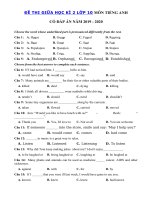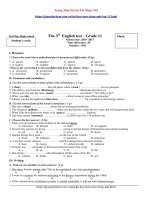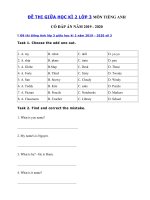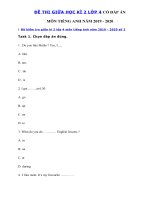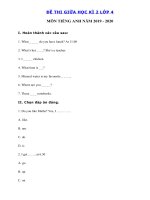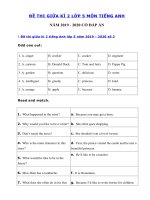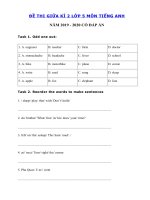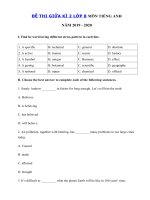- Trang chủ >>
- Đề thi >>
- Đề thi lớp 9
Đề thi giữa học kì 2 tiếng anh 9 (Đề 2)
Bạn đang xem bản rút gọn của tài liệu. Xem và tải ngay bản đầy đủ của tài liệu tại đây (165.1 KB, 10 trang )
VnDoc - Tải tài liệu, văn bản pháp luật, biểu mẫu miễn phí
ĐỀ THI GIỮA HỌC KÌ 2 LỚP 9 NĂM HỌC 2018 - 2019
MÔN TIẾNG ANH
I. Choose the word in each line that is pronounced differently in the part underlined.
(1 P)
1. A. Promote
B. erosion
C. dominate
D. noteworthy
2. A. Versatile
B.operate
C.emergency
D. prefer
3. A. Flexible
B. explore
C. galaxy
D. exotic
4. A. Massive
B. breathtaking
C. maple
D. staple
5. A. Confusion
B. explosion
C. persuasion
D. extension
II. Choose the best option A, B, C, or D to complete the sentences. (1 p)
1. In the world today people _____around 2,700 different language.
A. Speak
B. say
converse
C.
D.communicate
2. My sister enjoys travelling round different countries. She is going on a _____ of
Scotland this summer.
A. Journey
B. voyage
C. tour
D. travel
3. The sentence “The quick brown fox jumps over the lazy dog’ _____all 26 letters in the
English alphabet.
A. Writes
B. uses
C. utilises
D.
consumes
4. If you put those sweets in your cola, the bottle _______ explode.
A. Might
B. should
C. must
D. ought
VnDoc - Tải tài liệu, văn bản pháp luật, biểu mẫu miễn phí
5. Be patient. You can’t _____ to learn a foreign language in a week.
A. Believe
B. expect
C. consider
D. think
6. The main ______ of this drink are wine, orange juice and bitters.
A. Parts
B. compositions
C. components
D.
ingredients
7. You _____ see a Yeti if you go to the Himalayas
A. Had to
B. must
C. would
D.
might
8. Once we get to the hotel, let’s just ______ quickly and then do a bit of sightseeing.
A. Set down
B. make up
C. check in
D.
turn up
9. Your doctor, ______advice you ought to listen to, is a clever man indeed.
A. Who
whose
B. whom
C.
D. which
10. I paid______ attention, and I didn’t hear what the others were saying.
A. Little
much
B. a little
C.
D. a lot of
III.Fill each blank in the passage with a suitable word. (1 p)
Modern tourism began with the transition from a rural to an industrial society, the
rise of the automobile, and the expansion of road and highway systems. (1) ________the
Second World War, travel for pleasure was limited to the wealthy, but since then, improved
standards of living and the availability of transportation have (2)______more people to
indulge. In the 1960s, improvements in aircraft (3)______ and the development of
commercial jet airlines enabled fast international travel. The (4)________ industry exploded.
VnDoc - Tải tài liệu, văn bản pháp luật, biểu mẫu miễn phí
Today, airports in nearly every country (5)_________ accommodate jumbo jets full of
tourists seeking exotic destinations.
IV.Match the beginnings of sentences 1-10 to their endings a-j. (1 p)
1. English is …..
2. More people speak…..
3. In the year 1000, English …..
4. By the beginning of the 21st century, English had…..
5. The English language was…..
6. A hundred years ago the world was …..
7. Since 1997, increasing numbers of Chinese students have …..
8. At present, over a billion people are…..
9. Immigration, new technologies, popular culture and even war have…..
10. Noah Webster is largely responsible …..
a. Learning English worldwide.
b. Had approximately 40,000 words.
c. All contributed to the growth of English.
d. Using French as an international language.
e. Grown to over 500,000 words.
f. Been coming to England to improve their English.
g. Mandarin Chinese than any other language in the world.
h. Taken to North America by settlers in the 17th century.
i. For the differences between American and British spelling.
VnDoc - Tải tài liệu, văn bản pháp luật, biểu mẫu miễn phí
j. Used as a first language in at least 75 countries around the world.
V. Insert a/ an, the or no article (0) in each of the blanks. (1 p)
Spanish is one of the most widely spoken languages in (1)_____ world. It is spoken all over
(2) ______ South America except for (3) _______ Brazil, not to mention Spain, Cuba, and
the U.S. Like Italian and Portuguese, (4) ____ Spanish language is related to Latin. (5)
______ recent report stated that (6) ________ number of Spanish speakers in
(7)_______United States of America will be higher than the number of English speakers by
(8) _____ year 2090. As (9) ______ result of this, nearly all North American schools teach
Spanish. There is (10) ______ interest in Spanish in the U.S., as many English words are
borrowed from the language, including: tornado, bonanza, patio…
VI. Read the passage and choose the correct answer to each question. (1 p)
WHAT ARE THE ORIGINS OF THE HAMBURGER?
We will probably never know who first sold a beef inside a bun, but there are lots of
contenders for having invented something similar.
Genghis Khan and his army of Mongol horsemen used to snack on raw beef which they
kept underneath their saddles. They also ground meat from lamb or mutton. This was fast
food for busy warriors on horseback at that time. When the Mongols invaded Russia, the
snack became known as “Steak Tartare”. In the 17th and 18th centuries trade between
Germany and Russia gave rise to the “Tartare steak”, while the “Hamburg steak” became
popular with German sailors along the New York City harbour.
It’s speculated that the first “Hamburger steak” was served at Delmonico’s Restaurant in
New York City ini 834, but not in a bun. In 1885 Charlie “Hamburger” Nagreen served
flattened meatballs between two slices of bread. As late as 1904 Fletcher Davis of Athens,
Texas, attracted much attention when he sold his hamburgers
at the St. Louis World’s Fair. Davis’s claim to having originated the hamburger has been
supported by both McDonalds and Dairy Queen.
VnDoc - Tải tài liệu, văn bản pháp luật, biểu mẫu miễn phí
Brothers Frank and Charles Menches may also have made a major contribution to
hamburger history: they sold ground pork sandwiches at the Erie Country Fair in New York,
but one day in 1885, they were forced to use chopped beef because their butcher had run out
of pork. They mixed in some coffee and brown sugar to beef up the taste and sold their
“Hamburger Sandwiches.” The name “Hamburger” came from Hamburg, New York, the
location of the fair.
1. Which of the following is NOT stated about the Mongols in paragraph 2?
A. They occupied the Russian territories.
B. They used to eat while riding a horse.
C. They kept lambs and mutton nearby.
D. They used to eat non-cooked meat.
2. Which of the following is stated in the passage?
A. Tartar stake became popular in the 17th century.
B. Minced beef appeared in the 15th century.
C. Hamburger was first served in Germany.
D. Sailors brought hamburger steak to New York.
3. Whom was “hamburger steak” invented by, according to paragraph 3?
A. Charlie “Hamburger” Nagreen
B. Fletcher Davis
C. McDonalds
D. Delmonico
4. What was the Menches’ contribution to hamburger history?
A. They began to ground pork for sandwiches.
VnDoc - Tải tài liệu, văn bản pháp luật, biểu mẫu miễn phí
B. They used another meat and added flavors.
C. They began to use chopped pork.
D. They changed the taste of pork.
5. Where did “hamburger” get its name from?
A. A man
B. A fair
C. A place
D. The Germans
VII. Choose the correct modal verbs in brackets to complete the passage. (1 p)
We are going on an expedition to find the source of the river. I’m taking a good map
because we (1. should/ might/ must) get lost! We (2 may/ought/ would) need a compass too.
I’m worried that we [3. should/must/may) not have enough food but we (4. need/ might/ can)
not carry more. I have my camera but it (5. may/ should/ ought) not work in the cold. So, we
might see the source of the river but we (6. should/ would/could) not take any pictures. This
is a good thing because the people who live there (7. may/can/should) not like it. Well, if we
were lucky, we (8. may/must/could) find the source of the river, but if we (9. could/
would/need), I’d write a book about our expedition. We (10. can/ might/must) be famous
one day!
VIII. Choose the correct option for each blank to complete the passage. (1 p)
Most British people go abroad on holiday to visit family, or on short business trip. People
are (1) _____ to find out how to get urgent treatment before leaving the UK. They have to
(2) ______ a form which explains what they should do if they fall ill or have an accident,
and what arrangements exist in their country for medical treatment.
VnDoc - Tải tài liệu, văn bản pháp luật, biểu mẫu miễn phí
The regulations are fairly simple but (3) ______ people do not have this information, they
may find that private medical care is extremely expensive. It is not (4) _________ for
people to discover that they do not have enough money with them to pay the total costs and
in such (5) _______, an already difficult situation becomes even more complicated.
1. A. A dvised
B. Suggested
C. Said
D. Spoken
2. A. Put
B. Bring
C. Fill
D. Get
3. A. Because
B. Though
C. Unless
D. If
4. A. Strange
B. Unusual
C. Abnormal
D. Infrequent
5. A. Conditions
B. Positions
C. Circumstances
D. Places
IX. Use the words/ phrases given to write a letter from Sue to her parents. (2 p)
Dear Mum and Dad,
1. I/ have/ great time/ here/ England/.
______________________________________
2. Things/ great/ me/ since/ arrive/.
______________________________________
3. I/ live/ dormitory/ some foreign students/.
______________________________________
4. They/ come/ different parts/ the world/.
______________________________________
5. They/ be/ friendly/ helpful, their English/ much better/ mine/.
______________________________________
6. I/ practise/ speak/ English/ them/ every day/.
VnDoc - Tải tài liệu, văn bản pháp luật, biểu mẫu miễn phí
______________________________________
7. Now/I/ make/ good progress/.
______________________________________
8. My pronunciation/ much better/ and/I/ understand/ almost everything/.
______________________________________
9. I/ hope/ my English/ considerably/ improve/ when/ finish/ course/.
______________________________________
10. Write/ me/ soon/.
______________________________________
Lots of love
Sue
ANSWER KEY
I. (5 x 0.2 = 1 p)
1. C
2. B
3. D
4. A
5. D
II. (10×0.1 = 1 p)
1. A
6. D
III. (5×0.2 = 1 p)
1. Before
2. Allowed
3. Technology
2. C
7. D
3. B
4. A
5. B
8. C
9. C
10. A
VnDoc - Tải tài liệu, văn bản pháp luật, biểu mẫu miễn phí
4. Tourism
5. Can
IV. (10×0.1 = 1 p)
1. J
6. D
2. g
3. b
7. f
4. e
8. a
5. h
9. c
10. i
V. (10×0.1 = 1 p)
1. The
2.0
3.0
6. The
7. the
4. the
8. the
5. A
9. a
10. an
VI. (5 x 0.2 = 1 p)
1. C
2. A
3. B
4. B
5.
C
VII. (10×0.1 = 1 p)
1. Might
2. may
can
5. may
6. should
7. may
could
3. may
4.
8. could
9.
10. might
VIII. (5 x 0.2 = 1 p)
1. A
2. C
B
5.C
3. D
IX. (10×0.2 = 2 p)
1. I am having a great time here in England.
2. Things have been great with me since I arrived.
4.
VnDoc - Tải tài liệu, văn bản pháp luật, biểu mẫu miễn phí
3. I live/ I’m living in the dormitory with some foreign students.
4. They come from different parts of the world.
5. They are (very) friendly and helpful, and their English is much better than mine.
6. I (can) practise speaking English with them every day.
7. Now I am making /1 have made good progress.
8. My pronunciation is much better and I (can) understand almost everything.
9. I hope my English will considerably improve/ be improved when I finish/ have finished
the course.
10. Write to me soon.
Mời bạn đọc tham khảo thêm tài liệu Tiếng Anh lớp 9 tại đây:
Bài tập Tiếng Anh lớp 9 theo từng Unit: />Bài tập Tiếng Anh lớp 9 nâng cao: />Bài tập trắc nghiệm Tiếng Anh lớp 9 trực tuyến: />
